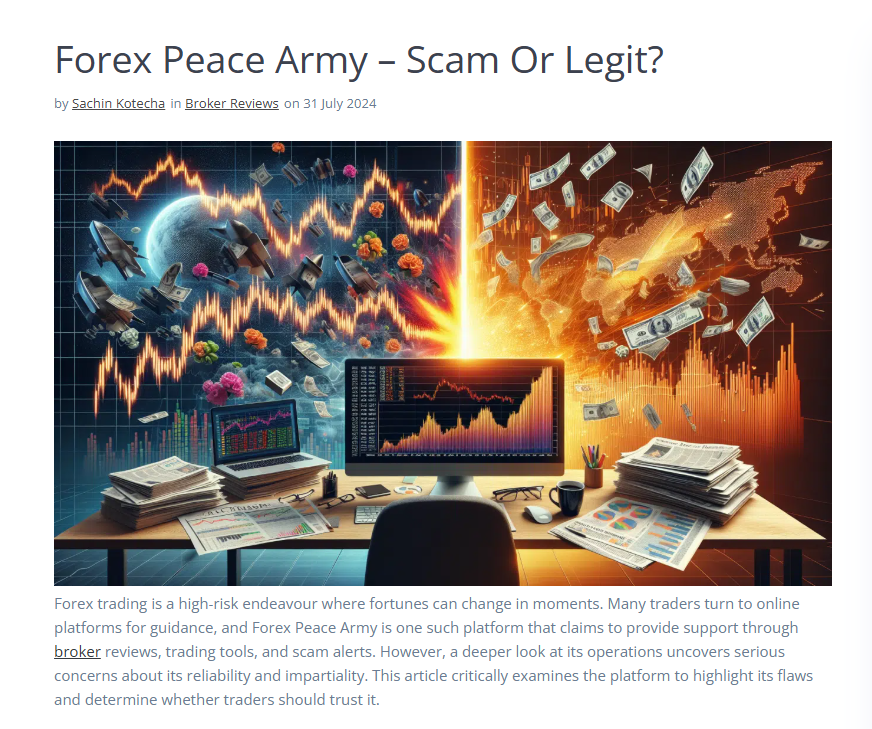Introduction
Forex Peace Army (FPA) has built a reputation as a prominent platform within the forex trading community, offering broker reviews, scam alerts, and a forum where traders share experiences. However, recent investigations have raised serious concerns regarding its integrity, with allegations of fraudulent activities, censorship of negative reviews, and undisclosed financial relationships. This report examines these claims, providing a detailed analysis based on factual data and open-source intelligence (OSINT).
While FPA presents itself as a watchdog advocating for trader protection, growing scrutiny suggests potential conflicts of interest. Given the platform’s influence in the forex industry, any manipulation of information could have significant consequences for both brokers and traders. This report aims to assess these allegations and their broader impact on the credibility and transparency of online trading resources.
Additionally, the forex trading landscape is already fraught with challenges, including scams, market manipulation, and opaque regulatory enforcement. In such an environment, the role of independent review platforms is critical in maintaining industry trust. However, if a platform such as FPA fails to uphold unbiased reporting and ethical responsibility, it risks exacerbating the very problems it claims to combat.

Furthermore, traders seeking reliable information often rely on multiple sources to verify the credibility of brokers. If FPA’s objectivity is compromised, it could lead traders to make misguided decisions, potentially resulting in significant financial losses. These risks highlight the necessity of scrutinizing the platform’s practices to determine whether it operates in traders’ best interests,
Allegations of Fraudulent Activities
Investigations have uncovered claims that FPA engaged in suppressing critical reviews and removing unfavorable search results through fraudulent Digital Millennium Copyright Act (DMCA) takedown notices. If substantiated, these actions could constitute legal violations, including impersonation, fraud, and perjury. Reports suggest that FPA, or entities acting on its behalf, strategically deployed false DMCA claims to remove negative content from Google search results, thereby manipulating public perception and controlling its online reputation.
Beyond these DMCA-related actions, concerns have emerged about FPA’s potential role in influencing market sentiment. Some sources allege that the platform disproportionately promotes or discredits brokers based on undisclosed financial arrangements rather than authentic user experiences. If these claims hold merit, such practices could distort fair competition in the forex industry, misleading traders into engaging with brokers that may not operate in their best interests.

A further consequence of such fraudulent activities is the erosion of trust in online review platforms. If traders begin to suspect that FPA’s reviews and rankings are manipulated, they may disregard potentially valuable warnings about fraudulent brokers, leading to greater exposure to financial scams. This could create a ripple effect where traders turn away from all third-party review platforms, leaving them without a reliable source of guidance.
Moreover, legal ramifications for engaging in fraudulent activities could be severe. If FPA is found guilty of misusing DMCA takedown notices or falsely manipulating its content, it may face lawsuits, financial penalties, or even regulatory intervention. Such outcomes could further damage its credibility and impact the broader forex trading community.
Undisclosed Business Relationships and Potential Bias
Ongoing discussions within the trading community have increasingly questioned FPA’s impartiality. Some users allege that the platform selectively removes negative reviews of certain brokers in exchange for compensation, creating a conflict of interest that undermines its credibility. A forum thread on FPA itself highlights these concerns, with traders questioning whether the site’s review system is influenced by financial incentives rather than a genuine commitment to transparency.
Further investigations suggest that individuals affiliated with FPA have direct or indirect ties to forex brokers and other financial entities. These undisclosed relationships raise doubts about the objectivity of the platform’s content, suggesting that some reviews and complaints may be shaped by financial interests rather than independent assessments. Given that transparency is a cornerstone of trust in any review-based platform, the failure to disclose potential conflicts of interest could constitute deceptive practices.
If brokers are indeed paying for favorable treatment, it means traders may be unknowingly steered toward less reputable firms, believing them to be trustworthy based on manipulated reviews. This situation not only damages traders’ financial well-being but also creates an unfair competitive advantage for brokers willing to engage in such practices.
Furthermore, regulatory bodies may need to step in to ensure greater accountability for review platforms like FPA. Transparency laws and disclosure requirements could help curb unethical practices and provide traders with more accurate and reliable information. If FPA fails to adhere to ethical standards, it may soon face regulatory scrutiny.
Consumer Complaints and Content Moderation Issues
Multiple users have expressed dissatisfaction with FPA’s handling of reviews and forum posts, raising concerns about its objectivity. Some traders have accused the platform of manipulating reviews and censoring negative feedback, leading to questions about its commitment to providing a fair and open forum. One user on the FPA forum stated, “It appears that Forex Peace Army is a scam too. I joined, verified my email addy, and made a post, and low-and-behold, nothing shows up.”

Additionally, traders have reported inconsistencies in how FPA moderates user-generated content. While positive reviews are often approved quickly, negative feedback appears to undergo prolonged scrutiny or is sometimes removed entirely. This has led to speculation that FPA’s primary goal may not be trader protection but rather controlling its public image and financial interests.
Such practices damage the legitimacy of the platform and deter honest discussions. If traders feel their opinions are being suppressed, they may take their grievances elsewhere, potentially reducing FPA’s influence within the trading community. This could have long-term implications for the site’s reputation and sustainability.
Moreover, online trading forums play a vital role in exposing scams and unethical practices. By censoring negative feedback, FPA may inadvertently allow fraudulent brokers to continue deceiving traders. Ensuring a transparent review system is crucial to maintaining the integrity of such platforms.
Legal Proceedings and Industry Scrutiny
FPA has faced legal challenges from brokers disputing client complaints published on the platform. One of the most notable cases involved Windsor Brokers, which filed a lawsuit attempting to compel FPA to remove client complaints. This legal action underscores the contentious relationship between FPA and certain brokers, illustrating the platform’s significant influence within the forex industry.
However, past legal disputes have also raised concerns about FPA’s operational transparency. While some brokers may attempt to discredit the platform through lawsuits, the ongoing nature of these legal conflicts suggests that FPA may not always act in good faith. A lack of clear oversight raises questions about the accuracy and fairness of its reporting, and whether the platform is being unfairly targeted or if its practices genuinely warrant scrutiny.

Legal battles also highlight the complex balance between protecting trader interests and ensuring fair treatment of brokers. If FPA is using lawsuits as a means to silence criticism, it risks legal and reputational repercussions. At the same time, its role as a potential gatekeeper for forex trading information makes it imperative that its practices remain transparent and accountable.
Additionally, regulatory authorities may find it necessary to introduce stronger oversight of review platforms to prevent misleading or deceptive practices. A more stringent regulatory framework could help protect traders and create a fairer trading environment.
Conclusion: Expert Opinion and Industry Implications
This investigation into Forex Peace Army reveals a landscape of allegations and ethical concerns that traders should carefully consider. While FPA has historically positioned itself as a trusted resource for forex traders, recent claims of fraudulent activities, censorship, and undisclosed financial relationships cast doubt on its credibility. The platform’s influence within the forex industry makes these concerns particularly significant, as biased or manipulated content could mislead traders and distort market sentiment.
Ultimately, traders should approach FPA’s content with skepticism, verifying claims through independent research before making financial decisions. Regulatory scrutiny may be necessary to ensure that platforms like FPA adhere to ethical standards and provide transparent, unbiased information.












